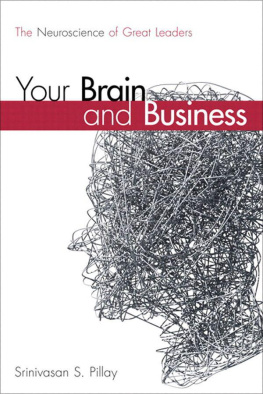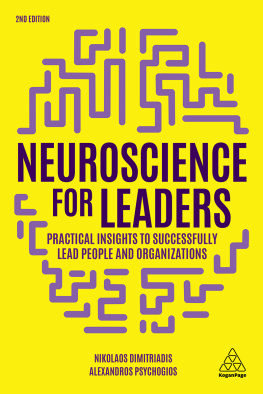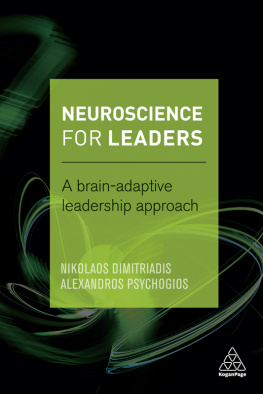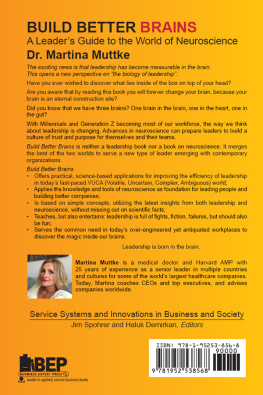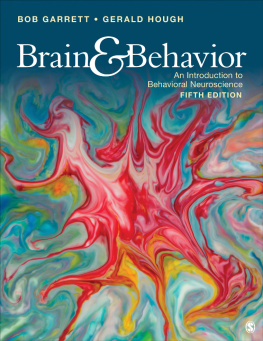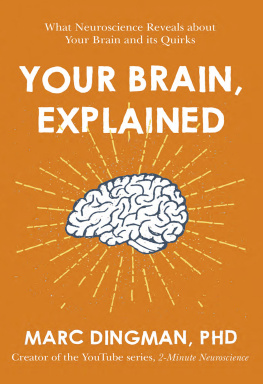
Your Brain and Business
The Neuroscience of Great Leaders
Srinivasan S. Pillay
Vice President, Publisher: Tim Moore
Associate Publisher and Director of Marketing: Amy Neidlinger
Executive Editor: Jeanne Glasser
Editorial Assistant: Pamela Boland
Development Editor: Russ Hall
Operations Manager: Gina Kanouse
Senior Marketing Manager: Julie Phifer
Publicity Manager: Laura Czaja
Assistant Marketing Manager: Megan Colvin
Cover Designer: Alan Clements
Managing Editor: Kristy Hart
Project Editor: Betsy Harris
Copy Editor: Bart Reed
Proofreader: Williams Woods Publishing Services
Indexer: Erika Millen
Compositor: Nonie Ratcliff
Manufacturing Buyer: Dan Uhrig
2011 by Srinivasan S. Pillay
Published by Pearson Education, Inc.
Publishing as FT Press
Upper Saddle River, New Jersey 07458
FT Press offers excellent discounts on this book when ordered in quantity for bulk purchases or special sales. For more information, please contact U.S. Corporate and Government Sales, 1-800-382-3419, .
Company and product names mentioned herein are the trademarks or registered trademarks of their respective owners.
All rights reserved. No part of this book may be reproduced, in any form or by any means, without permission in writing from the publisher.
Printed in the United States of America
First Printing March 2011
ISBN-13: 0-13-706444-6
ISBN-13: 978-0-13-706444-1
Pearson Education LTD.
Pearson Education Australia PTY, Limited.
Pearson Education Singapore, Pte. Ltd.
Pearson Education Asia, Ltd.
Pearson Education Canada, Ltd.
Pearson Educacin de Mexico, S.A. de C.V.
Pearson EducationJapan
Pearson Education Malaysia, Pte. Ltd.
Library of Congress Cataloging-in-Publication Data
Pillay, Srinivasan S.
Your brain and business : the neuroscience of great leaders/Srinivasan Pillay.
p. cm.
ISBN-13: 978-0-13-706444-1 (hardback : alk. paper)
ISBN-10: 0-13-706444-6
1. Executive coaching. 2. LeadershipPsychological aspects. 3. ManagementPsychological
aspects. 4. Executive ability. 5. Brain. I. Title.
HD30.4.P485 2011
658.407124dc22
2010031431
To Papa and the typewriter
Contents
Acknowledgments
I would like to acknowledge all those who believed that no meeting of ideas is impossible; in particular, the faculty of Wharton Business School and the people at FT Press. I would also like to acknowledge the continued inspiration of all those members of NeuroBusiness Group who have joined me in applying these basic principles to improve the lives of so many managers and leaders. Thanks to Alice Domar and Dave Ostrow for their generosity of spirit. And to Perry Zeus and Hendr Coetzee for encouraging me to pursue this line of thinking. Thanks also to Shervert Frazier for teaching me that understanding human psychology can be applied to any domain of human life and to Leston Havens for convincing me that the answers lie inside and that real power lies in the vulnerability of being human. Finally, to all those who love me and to those who allow me to love youI could not have done this without you.
About the Author
Srinivasan S. Pillay, M.D. , is a certified master executive coach, brain-imaging researcher, and Assistant Clinical Professor of Psychiatry at Harvard Medical School. He is also the Founder, CEO, and President of NeuroBusiness Groupan executive coaching company with coaches trained in the application of brain science to profitability and personal satisfaction in the business environment. Dr. Pillay has taught these methods with very high acclaim to executives from many companies, including but not limited to McKinsey, The World Bank, The MITRE Corporation, Genzyme, Novartis, Arab Banks of North America, CEO Clubs of Greece and Boston, Coca Cola, Pepsico, and Microchip. He has worked with coaches in a teaching or collaborative capacity from The Forum Corporation, Mobius Executive Leadership, and Triad Consulting. In addition, he has been invited to present his work in Boston, New York, Los Angeles, London, Switzerland, Greece, and Singapore, and his most recent presentations have been to executives from Africa, Asia, and the Middle East. Dr. Pillay is also the author of Life Unlocked: 7 Revolutionary Lessons to Overcome Fear (Rodale, August 2010), and he also writes for The Huffington Post and Psychology Today.
He is extensively sought out as a speaker and by the media. Select media appearances related to his business experience include The Financial Times in Greece, Epoca Magazine in Brazil, Forbes Magazine, The Pittsburgh Post Gazette, Investors Business Daily, Atlanta Journal Constitution, and the Sarasota Herald Tribune. Aside from his work on applying brain science to improving business performance, Dr. Pillay is also regarded as an international expert in burnout, stress, and anxiety, having been the Director of the Outpatient Anxiety Disorders Program at Mclean Hospital, consistently ranked the top freestanding psychiatric hospital in the United States for the past 20 years. Dr. Pillay lives in Newton, MA, and works out of Cambridge, MA.
Chapter 1. Relevance of Neuroscience to the Business Environment
It is one of my favorite times in teaching a class of managers, leaders, and coaches: those first five minutes when executives and leaders from a variety of personal and business backgroundssmall businesses and Fortune 100 companies, male and female coaches, in-your-face and one-step-at-a-time personalitiesare all united by a single question lurking at the back of their minds: What the heck does knowledge of the brain have to do with business?
There is even a faint look of horror on some of the faces of the participants who have come to this neurocoaching certification program as they learn that we will be talking for three days on how neuroscience informs business practices. Everyone sits back at first, preparing for the information deluge. But even within the first half-hour, I can sense a huh? response: Wait a minute. Maybe, just maybe, there is something here that I can use. By the end of the first hour, hands are up asking questions or down scribbling ideas, and fingers are tapping on the desk while the information being presented is processed. The brains of these listeners are suddenly faced with an understanding of themselves, and I can sense that there is a readiness to change. Is this not the point that all of us want to bring our clients to? And is this not the point when we say, Okay! Time to create the action plan.?
Andy Habermacher is the Managing Director of CTP (Corporate Training Programs) in Zurich, Switzerland. As a coach, he works with a wide variety of leaders, including prominent leaders of political organizations. This is what he wrote about his exposure to neuroscience: In the autumn of 2008 I sat down in a conference room in a hotel in New York. Just 15 minutes later I realized I now had in my hands an exceptionally powerful tool for coaching, for leadership and for change management. That was what I had realized after 15 minutes, now 6 months later do I still feel the same? No, now I would say it is my most powerful tool. And by saying that I dont mean that neuroscience makes my other tools and my love of all things psychology irrelevantno it simply makes them more relevant. I feel like I could see the nail before and knew where to bang the nail and was banging it with a brickstill effective, still doing the right things at more or less the right time. The concept and insights neuroscience brought me gave me the hammer to
Next page
